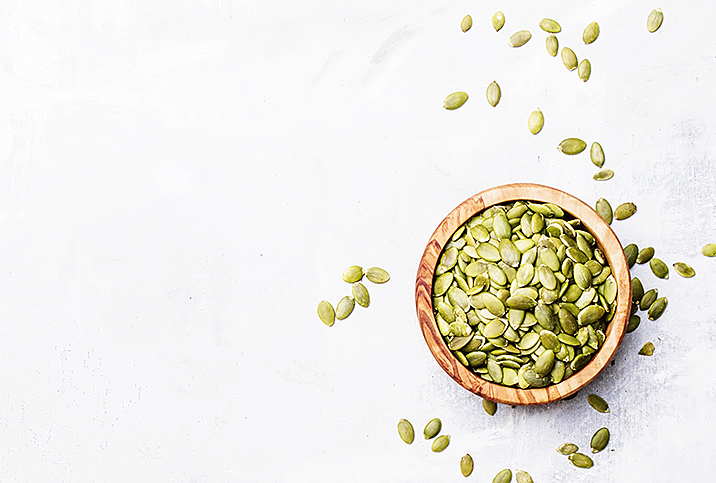5 Natural Treatments for an Enlarged Prostate

Medications and, less often, surgery are used to treat an enlarged prostate, but they come with risks and potential side effects. For instance, tadalafil (Cialis) can cause back pain and vision loss, while prostate surgery can lead to erectile dysfunction (ED) and bladder incontinence.
Men with an enlarged prostate who hope to minimize the potential side effects tied to conventional treatments can try natural treatments. Though many of these foods and supplements are not approved by the Food and Drug Administration (FDA) for the purposes of prostate treatment, they have been used for years in countries around the world, and the safety and efficacy of some of them have been demonstrated in a number of peer-reviewed medical journals.
Consult your doctor first, however, because some of these remedies may interfere with certain medications or may be less than ideal for you based on other health factors.
Pumpkin seeds
Pumpkin seeds are loaded with antioxidants and nutrients that contribute to healthy reproductive function and fertility, especially in men. Pumpkin seeds have also been shown to reduce urinary symptoms related to an enlarged prostate.
In a study published in Nutrition Research and Practice, 47 Korean men, each with an enlarged prostate, were given sweet potato starch, pumpkin seed oil, saw palmetto oil, or a combination of pumpkin seed oil and saw palmetto oil to treat their condition. Men who used either pumpkin seed oil or saw palmetto oil experienced a significant improvement in urinary flow rate after six months and 12 months, respectively. Another study, published in Pharmaceutics, found that combining pumpkin seed oil with tadalafil improved the efficacy of tadalafil in men using this medication to treat symptoms of enlarged prostate.
Dark leafy greens
Collard greens, bok choy and kale are some of the many dark, leafy greens that are considered superfoods due to the way they boost immunity and reduce the risk of cancer. Leafy greens have also proved promising at treating symptoms of enlarged prostate.
In a study published in the journal Medicine, researchers evaluated the effects of a diet high in dark leafy greens on Chinese men ages 65 and older with an enlarged prostate. They learned that after four years, men with a high intake of dark leafy greens were able to reduce their symptoms by 34.3 percent compared with men who consumed a moderate amount of dark leafy greens.
Stinging nettle
Stinging nettle, a flowering plant, has been used for centuries in traditional medicine, according to a study published in the journal Molecules. Stinging nettle is effective at battling symptoms of an enlarged prostate, as well as those related to bladder and urinary tract infections. Information from the Icahn School of Medicine at Mount Sinai shows that stinging nettle is widely used in Europe as a first-line treatment for enlarged prostate.
Another study gave stinging nettle to 287 patients with an enlarged prostate, while another 271 patients with the same condition were given a placebo. By the end of the six-month trial, the group that used stinging nettle experienced a significant reduction in symptoms and prostate size.
Lycopene
Lycopene is a red carotenoid and antioxidant found in red fruits, including carrots, watermelons and grapefruits. A study published in Medicine showed that lycopene may help prevent prostate cancer and reduce the growth of tumors in people diagnosed with prostate cancer. This evidence is consistent with the findings of another study that indicated lycopene may halt growth of the prostate.
Pygeum
Pygeum is an herb extracted from the bark of the African cherry tree and is claimed to relieve symptoms of an enlarged prostate and treat prostate cancer. It may also help reduce inflammation and various urinary conditions. Harvard Health Publishing reported that pygeum improved urinary symptoms in 263 men with an enlarged prostate, while another study showed that pygeum may help regulate prostate cancer and also reduce the risk of developing prostate cancer.
Before you try any of these natural, alternative treatments, consult your doctor to develop a plan specific to your unique health needs.
Giddy Notice: Our medical experts have informed us that few supplements of this nature have been approved by the Food and Drug Administration (FDA). That is to say that statements and claims made about the efficacy or possible health benefits of these unapproved supplements have neither been evaluated nor reviewed by the FDA for safety and effectiveness. Furthermore, any statements or claims regarding the supplements are not intended to diagnose, treat, prevent or cure any disease. Our medical experts advise that before you use a supplement in any way, first consult with your healthcare provider to ensure you have full knowledge of appropriate dosages, if any, as well as any potential side effects or interactions with any prescription medications you’re already taking.


















